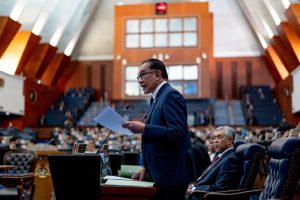Malaysian Prime Minister Anwar Ibrahim survived a parliamentary vote of confidence yesterday afternoon, shoring up his leadership and ensuring the stability of his government – at least for the immediate term.
Anwar was appointed prime minister after the general election of November 19 resulted in a hung parliament. What followed were five days of negotiations in which his Pakatan Harapan (PH) coalition, which won 82 parliamentary seats, vied with former Prime Minister Muhyiddin Yassin’s Perikatan Nasional bloc (74 seats) for the support necessary to form the next government.
Anwar eventually prevailed, forming a unity government with several smaller rival parties, including the once-dominant Barisan Nasional coalition, which he spent much of his career opposing.
The vote, which was called by Anwar’s government to be held at the start of a two-day special parliamentary session, was designed to dispel any doubts about his authority to govern, after Muhyiddin cast doubt on his support.
It came after the leaders of the various parties in Anwar’s government agreed on December 16 on a cooperation pact for a five-year term, promising to support him in the confidence vote. The pact has granted the backing of 148 lawmakers, a two-thirds majority that no leader has enjoyed since 2008.
The pact also established a set of common principles to unite the multifarious coalition. These include a commitment to political stability and economic development, promises of clean government – and most crucially – a pledge to uphold the rights of the country’s majority Malay community, which Anwar’s opponents have long accused him of plotting to dismantle.
The parties also promised to improve development in the Malaysian states of Sabah and Sarawak, a concession to the two Borneo-based coalitions, Gabungan Parti Sarawak and Gabungan Rakyat Sabah, which hold 23 and six parliamentary seats, respectively.
“We agreed on the broad parameters and broad policies including to ensure the government is stable,” the prime minister said after the signing of the pact. “We concede that no party managed to have a clear majority, therefore… it makes a lot of sense that we have to achieve this sort of understanding based on shared principles and policies.”
Muhyiddin’s coalition has criticized a clause in the government’s cooperation pact that put lawmakers at risk of losing their seats if they failed to follow the government line, describing it as unconstitutional and undemocratic.
The clause, like the pact as a whole, is intended to bring to an end a period of anomalous instability in Malaysian politics. Anwar is the fourth prime minister that the country has had since 2018, when Barisan Nasional lost a general election for the first time since independence in 1957. The PH government that took its place then collapsed in early 2020 amid mass defections by parliamentarians, giving way to two years of unstable and unelected minority coalitions.
Earlier this year, Malaysia passed a law to ban “party hopping,” to prevent future party defections, but as Reuters notes, the new rules do not stop political coalitions from withdrawing their allegiances as a bloc.
This ensures that while Anwar has sailed through yesterday’s vote of confidence, there is no guarantee that he will serve out his full term. Oh Ei Sun of the Singapore Institute of International Affairs told BenarNews last week that the pact was “just a document for clarification of expectations.”
“It provides an aura of formality to the coalition government and not much else – indeed, not stability,” he said.













